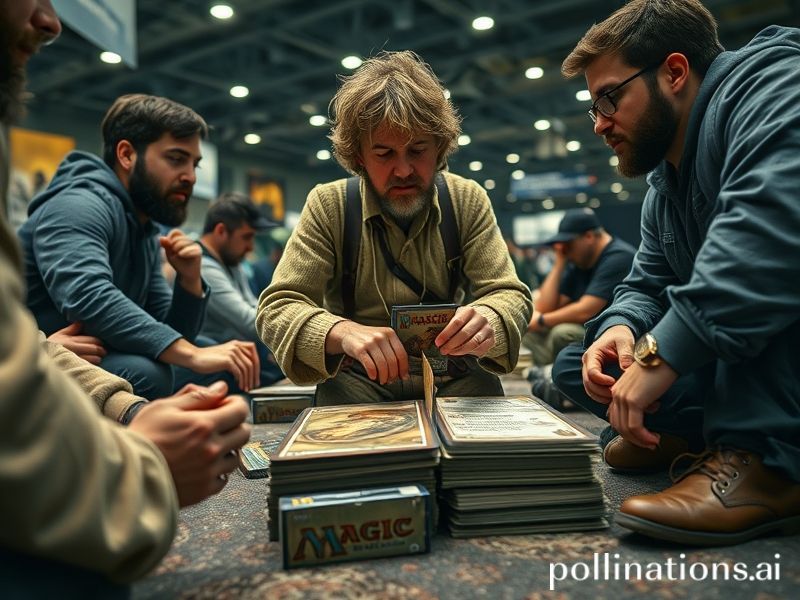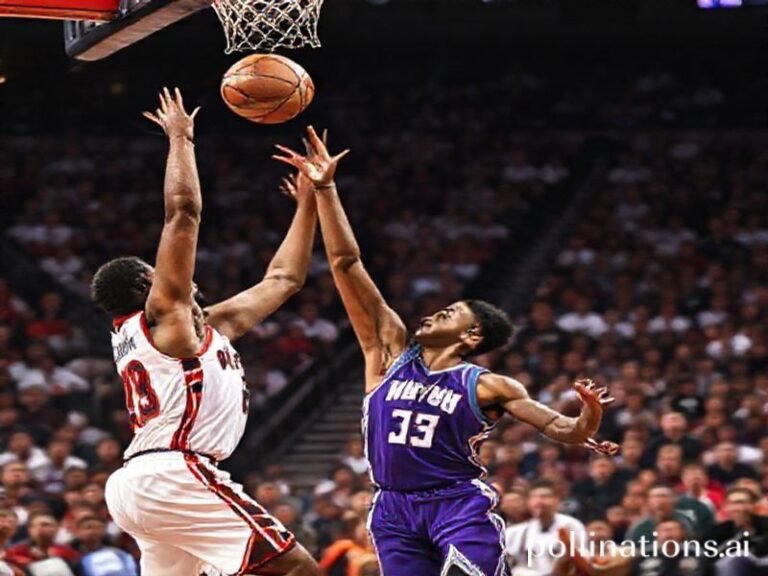Global Economy Holds Its Breath as MTG’s ‘The Hobbit’ Set Sparks Geopolitical Gold Rush
The Shire Goes Global: How a Fantasy Card Set Became the New Geopolitical Weather Vane
Dave’s Locker | International Desk | 12 June 2024
It began, as most modern crises do, with a Zoom leak. A blurry slide deck from Wizards of the Coast’s quarterly earnings call—captioned in Comic Sans, no less—revealed the next Magic: The Gathering tie-in: “The Lord of the Rings: Tales of Middle-earth – The Hobbit, Part II of II (Collector’s Edition).” Within minutes, #MTGHobbit was trending from Reykjavík to Rabat, and a Bulgarian crypto-mining collective had already minted an NFT of Bilbo’s contract with the dwarves. Somewhere in Brussels, a harried EU trade attaché asked why a card game about orcs now required a sanctions-compliance annex.
The set itself is mechanically harmless—more second breakfasts than second Cold War. Yet its release next month lands like a Mordor-forged spanner in the gears of global pop-culture détente. China’s NetEase is scrambling to localize flavor text that refers to “pipe-weed” without implying anything about actual weed. Meanwhile, the Turkish government has opened an investigation into whether Smaug constitutes unfair competition with the country’s sovereign gold reserves. At the United Nations, a delegate from New Zealand—whose entire GDP now appears to be hobbit-adjacent—proposed an annual “Middle-earth Multilateral Dialogue” to ensure “ring-based conflict prevention.” Everyone laughed until they realized he was serious.
The real action, naturally, is in the secondary market. A foil “One Ring” serialized 1/1 already changed hands for €2.3 million on the same day the European Central Bank raised interest rates. Analysts at Goldman Sachs issued a note titled “Precious Metals, Precious Cardboard,” advising clients to short silver and go long on mythic rares. In Mumbai, a startup is offering micro-loans collateralized by alpha-stamped Gollums; default rates hover at a polite 11 percent, roughly the same as student debt in the United States.
Critics call it late-stage capitalism wearing elven ears. Fans call it Tuesday. Both miss the point: the set has become a real-time stress test for global supply chains. English-language boosters are printed in Texas, Japanese ones in Saitama, Russian ones—until recently—in an ex-Khrushchev-era missile plant outside Yekaterinburg. Each version contains slightly different art: the Chinese printing omits all knives, the French adds more wine, and the American—because lawyers—replaces every pipe with a discreet Juul. The logistical ballet required to ship 500 million cards without reenacting the Siege of Minas Tirith is, frankly, more impressive than anything NATO has managed lately.
Then there’s the cultural diplomacy angle. Saudi Arabia’s sovereign wealth fund just bought a 5 percent stake in Hasbro, reportedly to “diversify into fantasy assets.” Crown Prince Mohammed bin Salman was overheard asking if Sauron’s eye could be repurposed as a tourist logo for NEOM. The Japanese foreign ministry, not to be outdone, dispatched an ambassador-level emissary to New Zealand to secure exclusive rights to a life-size Rivendell playmat for the 2025 Osaka Expo. Rumor has it the Swiss offered neutral arbitration, but only if they could mint a special “One Franc to Rule Them All.”
Of course, the loudest wailing comes from the purists. “Tolkien would spin in his Oxford grave,” cry the gatekeepers on Reddit, typing furiously between bites of UberEats lembas. They forget that Tolkien himself was a philologist, not a monetization strategist; the man once sold the film rights for a song because he needed a new roof. If anything, turning Middle-earth into glossy cardboard rectangles is the most honest tribute yet: every age gets the mythology it can afford, and this one runs on FOMO and foil-etched legendaries.
So when the first prerelease kits hit hobby stores from Lagos to Lima next month, take a moment to appreciate the spectacle. Nations will rise and fall, currencies will inflate and deflate, but somewhere a 14-year-old in Jakarta will crack a pack and pull a mythic Gandalf, blissfully unaware that the entire global economy just hiccupped. In the end, we are all just hobbits—short, greedy, and hopelessly addicted to shiny objects we swear have intrinsic value.
And if the world really does burn? At least the fire will be holographic.







